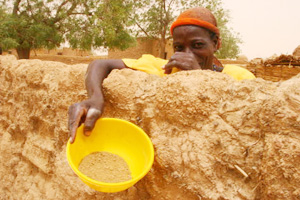
A woman holds a bowl of millet husks in Toudoun Jaka, Niger. In 2010, Nigeriens ate millet husks–normally used to feed livestock–because they lacked food.
Credits: Lane Hartill/CRS
“At this time of year, grain prices should be as low as possible. But it is quite the opposite this year,” writes Gaston Goro of Caritas Mali, speaking of the food situation in West Africa. “The desolation and anxiety affect everyone.”
Parts of West Africa faces a looming food crisis, this time primarily in the Sahel region. There have been significant declines in crop production in countries such as Niger and Mali. Food prices – especially for grains, including corn and millet – are high. The situation is seriously affecting access to food for the poorest households.
“The situation will last until next harvest, October 2013,” continues Goro about the situation in Mali. “If nothing is done, the crop failure could cause an acute food crisis.”
Caritas is closely monitoring the situation and planning a response that includes all Caritas members involved in the region, especially Caritas Niger, Caritas Mali, and Caritas Burkina Faso. Caritas set up a Sahel Working Group to provide coordination in responding to any food crises and to share early warning messages. Network members are on the ground evaluating needs in the most vulnerable communities.
“The situation is still evolving, but a major risk is there,” says Floriana Polito, Humanitarian Policy Officer of Caritas Internationalis. “We need to be vigilant and monitor the situation.”
In 2010 and 2005, the Sahel region also faced food shortages. “The lesson then was that delays in aid cost lives,” said Raymond Yoro, Secretary General of Caritas Niger, of the 2005 crisis.
Caritas is preparing to intervene before the situation worsens. “If we take action now, it will cost us far less than if we were to wait until it’s a catastrophe,” says Philippe Mougin, West Africa Coordinator for CAFOD (a Caritas member based in the UK). “Sadly , hunger is a recurring theme in this region, a slow-burning problem that rarely hits the headlines.
“Responding now means that we can combat malnourishment amongst the most vulnerable; women and children under five,” Mougin continues. “Caritas partners working together are trying to prevent the situation from deteriorating.”
Caritas’ strategy will include buying grain and selling it at subsidized prices; giving farmers seeds; strengthening villages’ ability to take ownership of existing “village food security stocks”; and paying impoverished people with money or with food to work on projects that benefit their communities. In a worst-case scenario, Caritas is prepared to distribute free food to prevent hunger.
“We don’t want another crisis like last year’s one in the Horn of Africa,” says Polito. “We want to avoid having a second food emergency in the space of a year.”
